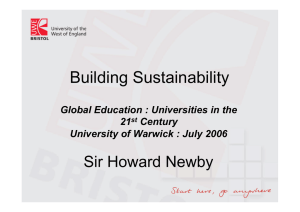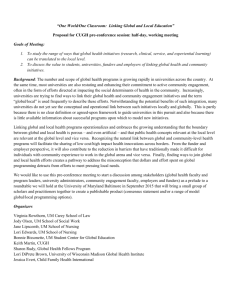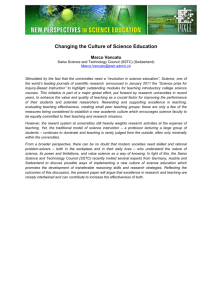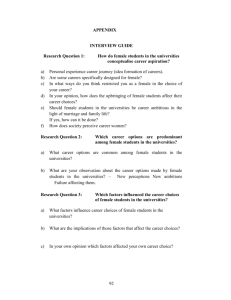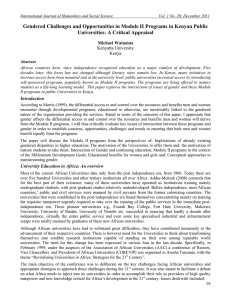THE CHANGING ROLE OF HIGHER EDUCATION IN A GLOBALISING WORLD PRESENTATION BY
advertisement
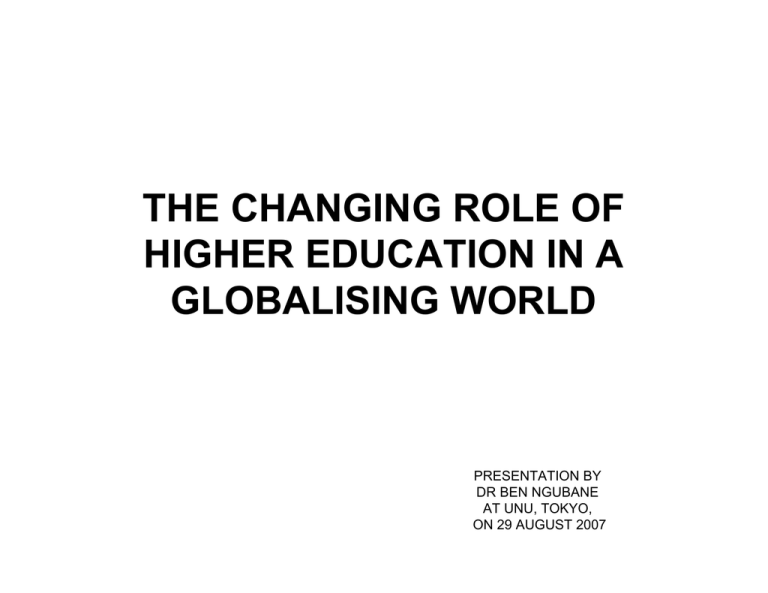
THE CHANGING ROLE OF HIGHER EDUCATION IN A GLOBALISING WORLD PRESENTATION BY DR BEN NGUBANE AT UNU, TOKYO, ON 29 AUGUST 2007 CHANGING ROLE OF HE INTRODUCTION • The context is dictated by the demands of globalisation and the needs to devise a comprehensive response to new competition determining the wealth and prosperity of nations. For South Africa the response is embedded in the twin programmes: – the Accelerated and Shared Growth Initiative of South Africa (AsgiSA) and the Joint Initiative for Priority Skills Acquisition (JIPSA) – the aim is to overcome the single greatest impediment, namely, shortage of suitable skilled labour, in order to realise an annual growth rate of at least 6% of GDP between 2010 and 2014 and – to create a favourable business, private investment and foreign direct investment environment and accordingly South Africa is continuing reform of higher education institutions. CHANGING ROLE OF HE - - - The TICAD IV Priorities (Tokyo International Conference for Africa’s Development) 28 May to 30 May 2008 in Yokohama are: boosting economic growth in Africa: strengthening support in on order to make the currently strong economic growth in Africa to be self sustained (in areas including trade and investment, infrastructure development, and agriculture); ensuring “Human Security”: assistance to help achieve MDGs and Consolidation of Peace as well as enhanced support to Democratization addressing Environmental Issues/ Climate Change: support efforts to address environmental issues and assist adaptation efforts, knowing that Africa is the most vulnerable continent to climate change. CHANGING ROLE OF HE – Mobilising knowledge and resources of the international community as well as endogenous knowledge institutions in Africa; All of the above point to the role higher education has to play in pursuit of Africa’s sustainable development: by developing professional skills such as those provided by engineers and scientists, financial personnel and project managers and skilled technical employees such as artisans and information technology technicians. CHANGING ROLE OF HE Higher Education in Africa: (the issues) - Africa, in common with the rest of the world, has universities modelled in the Western pattern of universities that emerged in the 15th and 16th century Europe. - As a result Africa’s universities also reflect western organisation and curriculum. In today’s borderless world of knowledge, brought forth by globalisation, African universities have to strive for international credibility by ensuring that: CHANGING ROLE OF HE (a) Structures for quality assurance within higher education and training, such as the Higher Education Quality Committees, are in place and functioning. In the case of South Africa the HEQC does national reviews of MBAs, university quality management audits and programme accreditation. (b) Africa’s higher education delivers skills appropriate to the 21st century in terms of employability, in partnership with government and industry stakeholders CHANGING ROLE OF HE (c) African higher education correctly interprets world trends and creates flexibility, openness and cost efficiencies which enable them to: - educate and train the youth of Africa to manage the integration of world markets; - participate in multidisciplinary research teams that are now the feature of advanced universities; - create effectively managed cross- border distance learning networks, especially for rural populations without access to contact universities; CHANGING ROLE OF HE The reform of Africa’s higher education must be seen by NEPAD as Africa’s comprehensive response to key strategic challenges posed by globalisation. Globalisation is about globalising knowledge societies and in this context all kinds of themes assume a higher profile -higher education has therefore the task of addressing broader scientific, value-laden as well as ethical issues arising out of technological change and social transformation -the university of the 21st century, or better still, the university of 2050 will have it’s focus on creativity and innovation as apart from the mass teaching of today, which will be handled through distributed learning CHANGING ROLE OF H.E. In Africa, research and development will both have to produce answers to major policy questions: - we need new directions in science and technology, social and economic development; this means - we need to go beyond universal access to primary education, and deal with value at all levels of the education pyramid. - we need to find ways to induce entrepreneurship which makes practical use of people coming out of the three levels of education (primary, secondary and tertiary levels). CHANGING ROLE OF H.E. The constraints on higher education for Africa are most severe: less than 1% of GDP gets allocated for research and the equipment at most of Africa’s universities is pathetically inadequate: - within this context questions need to be asked: “what is appropriate education in a village, education that will lift the life of the people”; - should we keep the basis of it in the country where we are, because if you create something that gets loose from its base it will never succeed? CHANGING ROLE OF H.E. Internationally, inter university as well as inter school cooperation is a critical success factor in Africa’s education and training programmes: - teacher and learner mobility, in both directions, helps knowledge, technology and skills transfer and Japan’s JICA has been improving mathematics and science teaching for South Africa through exchange programmes, - the South Africa – Japan University Forum held it’s first meeting at Hiroshima University in May this year. It’s second meeting will be in Cape Town in May 2008. CHANGING ROLE OF H.E. - The agreed principles that will guide the cooperation are a shared vision; complementarities; mutual benefit and uniqueness of opportunity. - The mechanisms for cooperation and collaboration, include post graduate student exchanges; post doctoral fellowships tenable in each country; joint research projects; internships and joint workshops for training in advanced research techniques; exchanges on best practice in curriculum development CHANGING ROLE OF H.E. Conclusion -in order to fully appraise the changing role of higher education in Africa, in the globalising world, donor countries will need to support collaborative university research in education (developed country universities and Africa’s universities) - Japan’s educational cooperation with Africa has been largely at the level of basic education, because Africa is a priority region for poverty reduction as designated in the Millennium Development Goals CHANGING ROLE OF H.E. - Traditionally, Japan’s educational cooperation in Asia has been offered primarily in the form of technical and vocational training aimed at developing skills - However there were many cooperation projects to build or expand facilities for agriculture, engineering and medicine in higher education institutions and Thailand is a prominent example of this higher education type of assistance. CHANGING ROLE OF H.E. - In Kenya, the Jomo Kenyatta University of Agriculture and Technology, a Japanese Government higher education cooperation project, is linking agriculture and technology. The project is producing new leaders to promote Kenya’s development and this type of cooperation is supporting the contribution of higher education to meeting the challenges which accompany the processes of globalisation. In this way the Japanese Government is investing directly into sustainable development in Africa.
